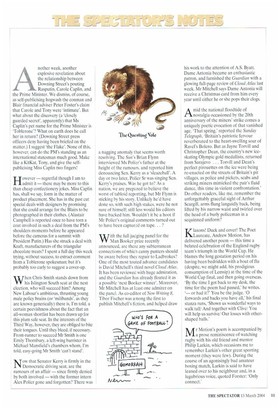The Questing Vole
Another week, another explosive revelation about the relationship between Downing Street's pouting Rasputin, Carole Caplin, and the Prime Minister. We dismiss, of course, as self-publicising hogwash the conman and Blair financial adviser Peter Foster's claim that Carole and Tony were 'intimate'. But what about the discovery (a 'closely guarded secret', apparently) that Ms Caplin's pet name for the Prime Minister is `Toblerone'? What on earth does he call her in return? (Downing Street press officers deny having been briefed on the matter.) I suggest 'the Flake'. None of this, however, can do the PM's standing as an international statesman much good. Make like a KitKat, Tony, and give the selfpublicising Miss Caplin two fingers!
However — regretful though I am to admit it — there may be more to this than cheap confectionery jokes. Miss Caplin has, shall we say, form in the matter of product placement. She has in the past cut special deals with designers by promising that she could arrange for the Blairs to be photographed in their clothes. (Alastair Campbell is reported once to have torn a coat involved in such a deal from the PM's shoulders moments before he appeared before the cameras for a summit with President Putin.) Has she struck a deal with Kraft, manufacturers of the triangular chocolate treats? I spent a full day this week trying, without success, to extract comment from a Toblerone spokesman; but it's probably too early to suggest a cover-up.
When Chris Smith stands down from his Islington South seat at the next election, who will succeed him? Among New Labour's ambitious, thrusting young male policy brains (or `milibands', as they are known generically) there is, I'm told, a certain peevishness about the fact that an all-woman shortlist has been drawn up for this plum safe seat. In the interests of the Third Way, however, they are obliged to bite their tongues. Until they bleed, if necessary. Front-runner to succeed Mr Smith is one Emily Thornbury, a left-wing barrister in Michael Mansfield's chambers whom, I'm told, easy-going Mr Smith 'can't stand'.
N°" that Senator Kerry is firmly in the Democratic driving seat, are the rumours of an affair — since firmly denied by both involved — with the former intern Alex Polier gone and forgotten? There was
a nagging anomaly that seems worth resolving. The Sun's Brian Flynn interviewed Ms Polier's father at the height of the rumours, and reported him denouncing Sen. Kerry as a `sleazeball'. A day or two later, Polier Sr was singing Sen. Kerry's praises. Was he got to? As a nation, we are prepared to believe the worst of tabloid reporting, but Mr Flynn is sticking by his story. Unlikely he'd have done so, with such high stakes, were he not sure of himself; still less would his editors have backed him. Wouldn't it be a hoot if Mr Polier's original comments turned out to have been captured on tape, . . ?
With the full judging panel for the Man Booker prize recently announced, are there any subterranean connections of which canny punters should be aware before they repair to Ladbrokes? One of the most touted advance candidates is David Mitchell's third novel Cloud Atlas, It has been reviewed with huge admiration, and the Guardian has already floated it as a possible 'next Booker winner'. Moreover, Mr Mitchell has at least one admirer on the panel. As co-editor of New Writing 8, Tibor Fischer was among the first to publish Mitchell's fiction, and helped draw
his work to the attention of A.S. Byatt. Dame Antonia became an enthusiastic patron, and furnished the Guardian with a glowing full-page review of Cloud Atlas last week. Mr Mitchell says Dame Antonia will receive a Christmas card from him every year until either he or she pops their clogs.
Amid the national floodtide of nostalgia occasioned by the 20th anniversary of the miners' strike comes a uniquely poetic evocation of that vanished age. 'That spring,' reported the Sunday Telegraph. 'Britain's patriotic fervour reverberated to the heart-swelling soar of Ravel's Bolero. But as Jayne Torvill and Christopher Dean, the country's new iceskating Olympic gold medallists, returned from Sarajevo . . . Ton-ill and Dean's perfect pirouettes on the ice were being re-enacted on the streets of Britain's pit villages, as police and pickets, scabs and striking miners mimicked the pair's fluid dance, this time in violent confrontation.' Do other readers, like me, remember the unforgettably graceful sight of Arthur Scargill, arms flung languidly back, being lifted by his narrow waist and twirled over the head of a burly policeman in a sequinned uniform?
Klaxons! Duck and cover! The Poet Laureate, Andrew Motion, has delivered another poem — this time a belated celebration of the England rugby team's triumph in the World Cup. He blames the long gestation period on his having been bedridden with a bout of flu (despite, we might add, his prodigious consumption of Lernsip) at the time of the World Cup final, and then going overseas. 'By the time I got back to my desk, the time for the poem had passed,' he writes. `— or had it?' You be the judge. '0 forwards and backs you have all,' his final stanza runs, 'Shown us wonderful ways to walk tall/ And together with Clive/ You will help us survive/ Our losses with othershaped balls.'
r Motion's poem is accompanied by a prose reminiscence of watching rugby with his old friend and mentor Philip Larkin, which occasions me to remember Larkin's other great sporting moment (they were few). During the course of an agonisingly bad amateur boxing match, Larkin is said to have leaned over to his neighbour and, in a lugubrious voice, quoted Forster: 'Only connect.'


































































 Previous page
Previous page